- Home
- Diana Wynne Jones
Unexpected Magic Page 4
Unexpected Magic Read online
Page 4
“Not in so many words,” said Adny. “You don’t think I’d be fool enough to move against the strength of the Matriarchy without getting hold of a conscious-class computer first, do you?”
F. C. Stone wished to say that yes, she did. People took that sort of desperate risk in her books all the time. It depressed her to find him such a cautious rebel. And he had cheated her, as well as his sleeping beauty, and no doubt he was all set to turn the whole works into a Patriarchy. It was a total waste of a morning.
Or was it? she wondered. A matriarchy where men were sold as slaves was right up her street. There was certainly a book in there. Perhaps she should simply be grateful and hope that Adny did not get too far.
“Tell me,” she said, at which he looked up warily from his cup, “what is that stuff you’re drinking? Goffa? Xvay?”
She was glad to see she had surprised him. “Only coffee,” he said.
The Plague of Peacocks
From the moment the Platts came to Chipping Hanbury everyone knew they were Caring People. They bought the old cottage up Weavers Close beside the field where the children went to cycle and play football. Mr. Platt took the cottage apart all by himself and built it up again and painted it white. Mrs. Platt took the garden apart and painted everything there white too.
When they had done that, they began caring for Chipping Hanbury.
Mr. Platt brought out a news sheet which he called Hanbury Village News and put a copy through everyone’s door. The copies were addressed to everyone by their first names in the most friendly way: the Willises’ was to Glenda and Jack, the Moores’ to Lily and Tony, the Dougals’ to Marcia and Ken, and so on. Everyone wondered how Mr. Platt knew their names, and whether he was right to call Hanbury a village when it was really just a place on the edge of London. The news sheet was full of kind advice about how Hanbury needed more streetlights and a bus shelter and tidier front gardens. Weavers Pond was full of rubbish too, Mr. Platt said reproachfully, and the football field ought to be a proper sports center. People like Glenda and Jack, who had private incomes, really ought to see about cleaning the place up.
“Why does he think we have private incomes?” said Mrs. Willis. “Because the children have ponies?” Mrs. Willis did typing for people in order to pay for the ponies and she was rather hurt.
Meanwhile, Mrs. Platt was caring for animals. The first to go was the Dougals’ cat Sooty. Then the Deans’ dog Lambert. Then Holly Smith’s angora rabbit. Mrs. Platt called on the Dougals, the Deans, and the Smiths and explained at length that she had found the animal wandering about, and it might have gone in the road, and there was such a lot of traffic these days, and one should keep pets tied up. Mrs. Platt was thin, with intense gray eyes, and she bent forward nervously when she talked, and twisted her hands together. People found it hard to interrupt her when she was so worried. But after an hour or so, the Dougals and the Deans and the Smiths plucked up courage to ask what had happened to their animals. Mrs. Platt explained that she had put them in the car and Mr. Platt had driven them to a vet he knew, to have them put down.
Mr. Platt’s next news sheet had a sorrowful page on how badly people looked after their animals. The other pages were about the new greenhouses Mr. Platt was building behind the cottage. Mr. Platt was a thick energetic man with a beard and juicy red lips, and he had a passion for building greenhouses. When he was not doing that, he was either standing with his head back and his chest out admiring the latest greenhouse, or he was walking around Hanbury looking for news to put in his news sheet. He was walking in Hart Lane when Sarah Willis got run away with by her pony.
What made Chunter bolt was a mystery. Sarah always said he had seen Mr. Platt and was afraid of being taken to the vet too. Anyway, there was Chunter hammering along the road, striking frantic sparks from it with his hooves, with Sarah clinging on for dear life, when Mr. Platt came jumping out of the hedge and swung on Chunter’s bridle.
“Thanks,” said Sarah, when Chunter had stopped.
“You should never, never let a pony gallop on a tarmac road,” said Mr. Platt. “I don’t think anyone has explained to you: it ruins their feet and jars their legs.”
“But I didn’t—!” said Sarah. That was all she managed to say, because Mr. Platt proved to be just as good a talker as his wife, and he walked back to the house with her, holding Chunter’s bridle and explaining gently how you should treat a pony. “I think I must come inside and explain to Glenda that you shouldn’t ride without proper supervision,” he said when they got there. And he did. When he had done that, he went out to look at the barn where the ponies lived and came back to tell Mrs. Willis that it was not suitable for ponies.
Mrs. Willis was typing somebody’s book about the history of Poland, full of names like Mrzchtochky, and she left out several zs. “I shall go mad,” she said.
“Don’t worry,” said Sarah. “There’s always Daniel Emanuel.”
No one had yet told the Platts about Daniel Emanuel. This was odd, because Daniel Emanuel was well known to be interested in animals too. Only the week before, he had fallen out of the oak tree in the football field trying to catch a squirrel. Last year he had cut himself on rusty iron wading into Weavers Pond after a duck and nearly died of tetanus, because he had heard you could eat ducks.
Mrs. Platt met Daniel Emanuel first. She was coming home after caring for the Moores’ budgie. She had found it on her windowsill. By this time, she had noticed that people did not quite like it when she took their pets to the vet. So she took the budgie home. “Look, Lily,” she explained, “I’ve cut his wings for you, ever so neatly, so that he won’t be able to fly away again.”
“How kind!” Mrs. Moore said bitterly, thinking she would have to keep the cat in the yard in case Mrs. Platt cared for the cat too. “You’ll have to keep the budgie in your bedroom,” she said to her son Terry. “I hope Daniel Emanuel does something to the Platts soon!”
Mrs. Platt had got halfway home, to the bottom of the main road, when she saw, to her horror, a four-year-old boy walk out into the traffic. A bus bucked to a stop almost on top of him. Two cars missed him by two separate miracles. Mrs. Platt rushed into the road and seized the child’s arm. “Who are you, little man? Does your mummy know you’re out?”
He looked up at her. “I’m Daniel Emanuel of course,” he said. He had curly hair and long eyelashes and a band of freckles across his nose.
“Where do you live?” said Mrs. Platt.
Daniel Emanuel did not seem to be sure. He let Mrs. Platt lead him around Chipping Hanbury. She seemed to want to, and he felt like a walk anyway. After an hour or so though, she began to bother him. She kept asking things and calling him “little man.” The only little men Daniel Emanuel had ever heard of were the dwarves in “Snow White,” and he began to be afraid he would not grow any more. He took Mrs. Platt home so that he could ask Linda.
Mrs. Platt looked at the O’Flahertys’ tall ramshackle house with pieces of car lying about the front garden under the washing line. Children were running and screaming, and Mrs. O’Flaherty was anxiously looking over the front gate. “This is a Problem Family,” Mrs. Platt said to herself, “and I must care for them.”
“Daniel Emanuel!” everyone in the garden screamed.
“He was walking in the traffic,” Mrs. Platt explained. She had meant to have a long talk with Mrs. O’Flaherty about her problems, but Mrs. O’Flaherty was so glad to see Daniel Emanuel safe that she took him straight indoors. “No manners either,” Mrs. Platt said sorrowfully.
Indoors, Mrs. O’Flaherty said, “You naughty boy!” and raised her fist. Daniel Emanuel’s face screwed up miserably. “Oh, I can’t hit him!” said Mrs. O’Flaherty and she took her fist down. Daniel Emanuel unscrewed his face and beamed. “Linda,” said Mrs. O’Flaherty, “why did you let him go in the road?”
Linda was five, and the only one who knew how to manage Daniel Emanuel. She shrugged. There were times when even she could not stop Daniel Emanuel. “He can think,
” she explained, “and the cars just stop.”
“He may think they will, but they don’t,” said Mrs. O’Flaherty and hurried away to get lunch. A mother who had seven children and a husband who spends his spare time stock-car racing has not quite time to understand everything.
“Am I a little man?” Daniel Emanuel asked Linda anxiously.
Linda knew what he meant. “Not you!” she said. “You’ll grow bigger than Dad.”
Daniel Emanuel was much relieved. He was not sure he liked Mrs. Platt. She said things that were not true.
Mr. Platt’s next news sheet had a lot in it about Problem Families.
“Oh good,” said Mrs. Willis to Sarah and James. “They’ve met Daniel Emanuel.”
Next time Daniel Emanuel gave Linda the slip he went to look at the Platts’ cottage. He thought it was lovely. The stones around the flowers were painted white. There was a white wheelbarrow on the front lawn with flowers planted in it, which bothered Daniel Emanuel. Flowers should grow in the ground. Daniel Emanuel took the flowers out carefully and tipped the earth on the grass. He found Mr. Platt’s golf clubs in the porch and dug a hole for the flowers with them in front of the porch. He put the flowers in the hole and carefully opened the tap in the rainwater butt to give the flowers a drink. Then he found a pot of white paint in the porch and thought he ought to give the hole a white rim like the other flowerbeds. When Mr. Platt came around the house from building his fourth greenhouse, he found Daniel Emanuel squatting in a river using a bent golf club as a paintbrush.
Mr. Platt took Daniel Emanuel in a stern kind hand and led him home, talking gently to him about how wicked he was. Daniel Emanuel seemed a little vague about what wicked meant. Mr. Platt explained by telling him stories, and one of the stories was “Daniel in the Lions’ Den.”
“Oh Daniel Emanuel!” said Mrs. O’Flaherty when she opened the door. Daniel Emanuel was earth-colored with streaks of white. Mr. Platt was shocked to see that Mrs. O’Flaherty had been reading a book while she cooked lunch. She had two favorite books which she read turn and turn about to keep her sane: this one was The Mill on the Floss; the other was The Count of Monte Cristo. She knew both so well that she could do most things while she was reading.
Mr. Platt explained what Daniel Emanuel had done and gave Mrs. O’Flaherty long and patient advice on how to bring up children, until Mrs. O’Flaherty smelled the potatoes burning and snatched Daniel Emanuel up and ran. “What a feckless woman,” Mr. Platt said sadly.
Mrs. O’Flaherty was so annoyed about the potatoes that Daniel Emanuel barely got scolded. “Where’s any lions?” he asked Linda as soon as he was free.
“Aren’t any,” said Linda. “Only in cages in the zoo.”
The next day, Daniel Emanuel set out to find himself a cage of lions.
There are no lions in Chipping Hanbury. The only large beasts are Sarah Willis’s Chunter and James Willis’s Ben. Daniel Emanuel was seen by James standing in the doorway of the ponies’ barn. “Is this a den?” Daniel Emanuel asked.
“No,” said James. “It’s a stall.”
Daniel Emanuel nodded and went away. He was next heard of eight miles away in Abbots Hanbury. How he got there Daniel Emanuel never said, but there he was. He was in a pen in the cattle market with a hundred pigs, angrily shouting, “Bite me!” His father was home when the police telephoned. He drove his newest car to Abbots Hanbury and fetched Daniel Emanuel away. Since Mr. O’Flaherty was the only person in the world that Daniel Emanuel was afraid of, Daniel Emanuel arrived home very sore and sullen. “I don’t like Platts,” he told Linda.
Both the Platts were very concerned about Daniel Emanuel. Mr. Platt went to see Mr. O’Flaherty to tell him Daniel Emanuel needed special care, and the Dougals saw him leave again rather quickly. Mrs. Platt went to speak to Mrs. Willis. “Glenda,” she said, “I think we two should get together and care for our Problem Family. The O’Flahertys, you know.”
This time, Mrs. Willis was typing someone’s experimental novel. It went down the page in two columns which said the same thing, but not quite, and it had to catch the five o’clock post. “I don’t think they’re a problem,” she said. “Ask James and Sarah. Their main friends are Patrick and Thelma O’Flaherty. Do let me catch the post.” But Mrs. Platt stayed persuading Mrs. Willis till four o’clock. At four-thirty Mr. Platt arrived with some brochures, saying that he and Mrs. Platt thought Mrs. Willis ought to be using a word processor. When Sarah and James and Mr. Willis came home just after five, Mr. Platt was still there and Mrs. Willis was in tears.
“Do something!” said Mr. Willis.
James and Sarah saddled their ponies and went drumming away down the bridle path to the football field where Thelma and Patrick were riding their bicycles. “What is it?” said Patrick, propping himself on the hedge.
“Make Daniel Emanuel do something to the Platts,” said Sarah.
“You can borrow the ponies and we’ll go on a bike-and-pony trek if you do,” said James.
Thelma and Patrick looked wistfully at each other. It was an offer they couldn’t refuse. It cost Patrick a lot to say, “We can’t make him do anything.” And it cost Thelma just as much to add, “Linda’s his manager.”
“Ask her, and we’ll do the trek anyway,” said Sarah.
During the last month, Linda had been rather pestered. Holly Smith, Terry Moore, and Alastair Dougal had also made offers that couldn’t be refused to Brendan, Maureen, and Brian O’Flaherty. “He’s not ready to do anything yet,” she told Thelma and Patrick. “But I’ll try.”
Next Saturday, Sarah and James kept their promise and the trek set off to Beacon Hill. Linda kept hers by taking Daniel Emanuel for a walk in Weavers Close. But it was one of Daniel Emanuel’s saintly days. Nothing happened, except that Mrs. Platt saw them and hurried out saying, “Little children like you oughtn’t to be out alone!” She brought them inside the cottage, where it was neat and plain and brown, and made them sit down. Linda looked hopefully round for biscuits at least, but Mrs. Platt sat down too and told them the story of Jesus. Linda knew it. She had been sent home from school on her first day crying about Jesus. She turned paler and paler.
“Did it hurt much?” she whispered.
“What, dear?” asked Mrs. Platt.
“Being nailed up in a tree,” Linda whispered.
Mrs. Platt was rather taken aback. “Well—” Since she did not quite know what to tell Linda, she took them back home feeling she had given them both something to think about.
She had. While Mrs. O’Flaherty was trying to stop Linda crying, Daniel Emanuel collected four nails, a hammer and some string, and marched off to the oak tree in the football field to find out for himself if it hurt to be crucified.
Luckily for him, he got tangled in the string before he had banged in the first nail properly. Even more luckily, Sarah, James, Patrick, and Thelma happened to be coming home only an hour later after an almost perfect day. They heard the thin little wailing, which was all the noise Daniel Emanuel was able to make by then. “That’s Daniel Emanuel!” said Thelma, and managed to make Chunter gallop. And it was lucky the ponies were there. Daniel Emanuel was quite high up, hanging mostly by one arm. They managed to reach him by putting the ponies under the branch, with James, standing on the ponies, one foot on Chunter and one on Ben, boosting Patrick to the branch to cut the string. Sarah held the ponies and Thelma caught Daniel Emanuel as he came down. He hurt a lot, and he was frozen, and he was very angry. “It’s not good for people!” he kept saying as he rode home in front of Thelma. They put him to bed, and he brooded. He was very angry with both the Platts. They pretended to be kind and told you bad things.
Mr. and Mrs. Platt went from house to house with a petition to have the oak tree cut down. They said it was very dangerous.
“Wouldn’t it be easier to take Daniel Emanuel to the vet?” Mrs. Willis asked sweetly.
Mr. Platt didn’t follow her meaning at all; but he followed Mr. O’Flaherty’s meaning when Mr
. O’Flaherty told him what to do with his petition.
Daniel Emanuel was still brooding. “He’s nearly ready,” Linda told the others. Nearly every day, Daniel Emanuel went round to Weavers Close and stood looking at the cottage thinking what to do. When Mr. and Mrs. Platt came out to take him home, he had vanished before they got to the road. But one day the Platts went out in their car. Daniel Emanuel wandered through the garden and around the back. He wandered thoughtfully through all the greenhouses. Mr. Platt had never stopped building greenhouses. There were six by now. Daniel Emanuel ate tomatoes in one and picked a bunch of flowers in two. He made pies in flowerpots in the other three, thinking, thinking. But none of it gave him any ideas and he went away.
Mr. Platt did not want to meet Mr. O’Flaherty face-to-face again. He telephoned and pointed out that Daniel Emanuel was being allowed to run wild. It was not so much the tomatoes, he said, but the child’s own good. … The person the other end rang off. “Will you come here, Danny!” Mr. O’Flaherty roared. Mr. Platt would have been shocked at the storm which broke out then.
When it was over, Mr. O’Flaherty went out in the car to cool down. Mrs. O’Flaherty lay down and read The Count of Monte Cristo to calm her nerves. Daniel Emanuel, very sore and sullen, went to watch television.
It was a program about birds. The hen-bird came tiptoeing onto the screen, thin and brown and nervy, jerking its little head in just the same way that Mrs. Platt did when she explained something for your own good. The cock-bird strutted on and bent its neck back just like Mr. Platt. Then it spread out a great circle of tail and looked exactly like Mr. Platt admiring a greenhouse.
“Platt, Platt!” shrieked Daniel Emanuel and ran to find Linda.
Linda was cooking. She had tipped in a bag of flour and a bag of sugar, and she was trying to crunch in a dozen eggs with a fork before Mrs. O’Flaherty stopped reading and found her. “I’m busy,” she said. But her sleeve was being pulled in a particular way. She went with Daniel Emanuel and a trail of flour and mashed eggshell and looked at the television. “Peacocks,” she said.

 Fire and Hemlock
Fire and Hemlock Reflections: On the Magic of Writing
Reflections: On the Magic of Writing The Game
The Game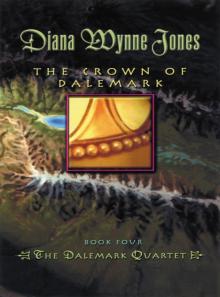 The Crown of Dalemark
The Crown of Dalemark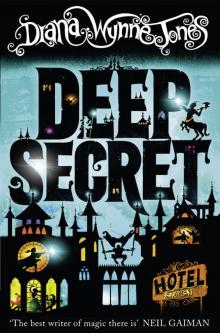 Deep Secret
Deep Secret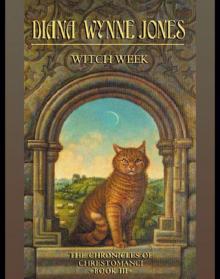 Witch Week
Witch Week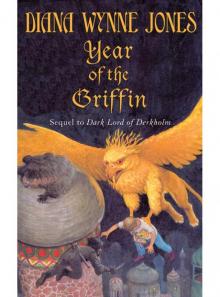 Year of the Griffin
Year of the Griffin Wild Robert
Wild Robert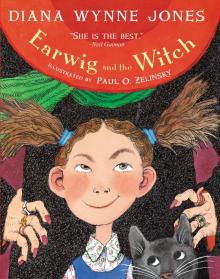 Earwig and the Witch
Earwig and the Witch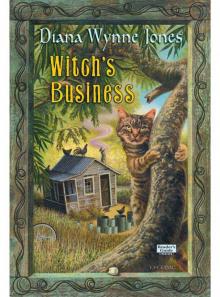 Witch's Business
Witch's Business Dogsbody
Dogsbody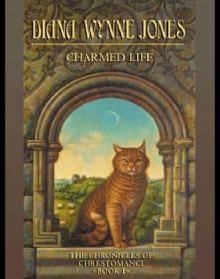 Caribbean Cruising
Caribbean Cruising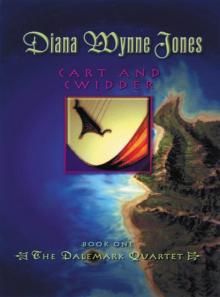 Cart and Cwidder
Cart and Cwidder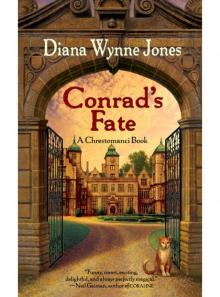 Conrad's Fate
Conrad's Fate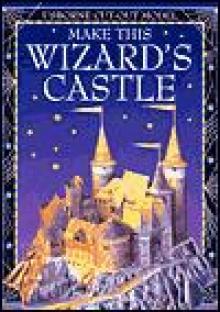 Howl's Moving Castle
Howl's Moving Castle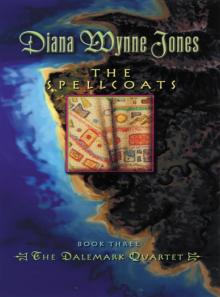 The Spellcoats
The Spellcoats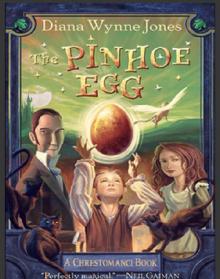 The Pinhoe Egg
The Pinhoe Egg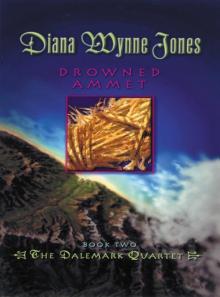 Drowned Ammet
Drowned Ammet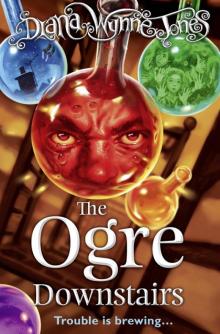 The Ogre Downstairs
The Ogre Downstairs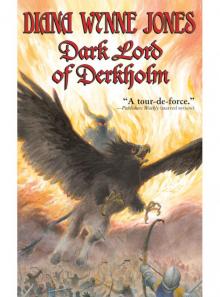 Dark Lord of Derkholm
Dark Lord of Derkholm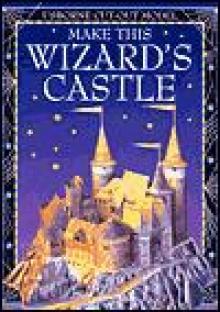 Castle in the Air
Castle in the Air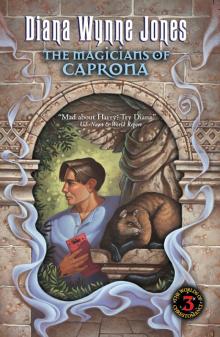 The Magicians of Caprona
The Magicians of Caprona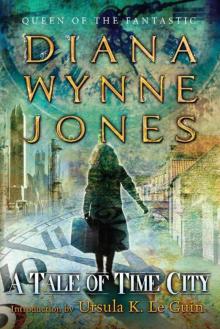 A Tale of Time City
A Tale of Time City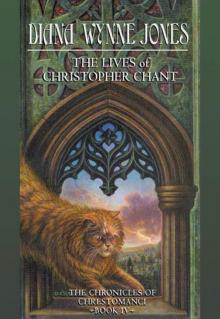 The Lives of Christopher Chant
The Lives of Christopher Chant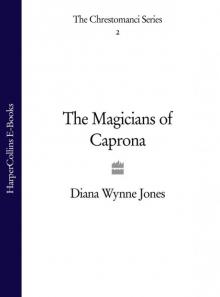 The Magicians of Caprona (UK)
The Magicians of Caprona (UK)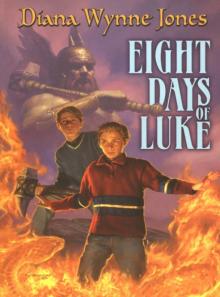 Eight Days of Luke
Eight Days of Luke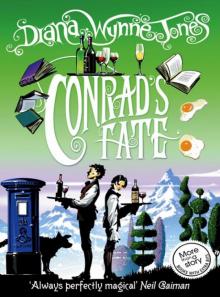 Conrad's Fate (UK)
Conrad's Fate (UK)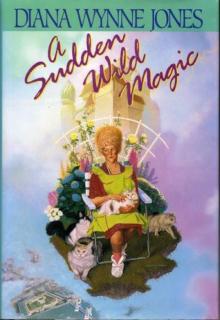 A Sudden Wild Magic
A Sudden Wild Magic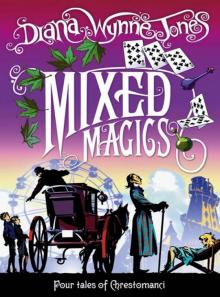 Mixed Magics (UK)
Mixed Magics (UK)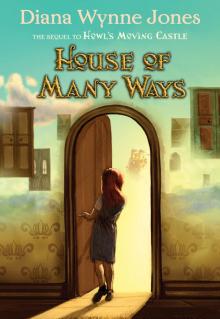 House of Many Ways
House of Many Ways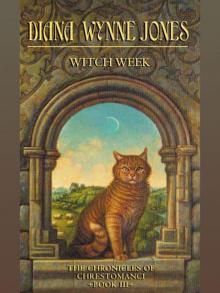 Witch Week (UK)
Witch Week (UK)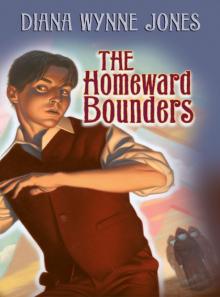 The Homeward Bounders
The Homeward Bounders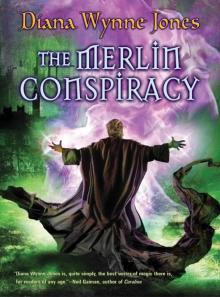 The Merlin Conspiracy
The Merlin Conspiracy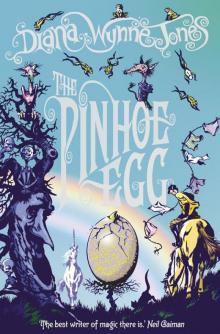 The Pinhoe Egg (UK)
The Pinhoe Egg (UK)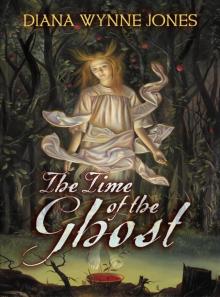 The Time of the Ghost
The Time of the Ghost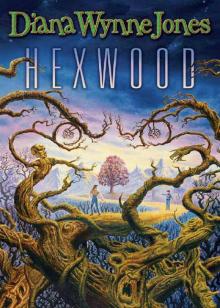 Hexwood
Hexwood Enchanted Glass
Enchanted Glass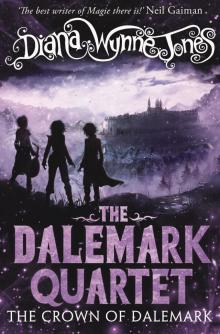 The Crown of Dalemark (UK)
The Crown of Dalemark (UK)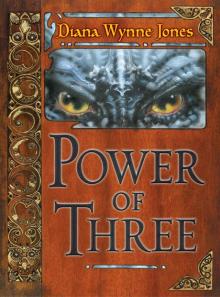 Power of Three
Power of Three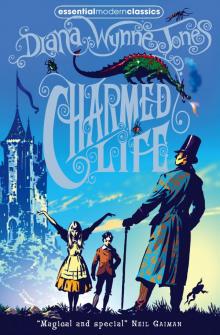 Charmed Life (UK)
Charmed Life (UK)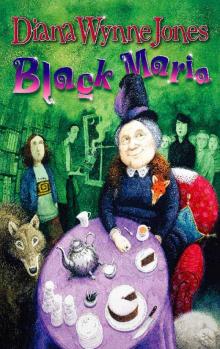 Black Maria
Black Maria The Islands of Chaldea
The Islands of Chaldea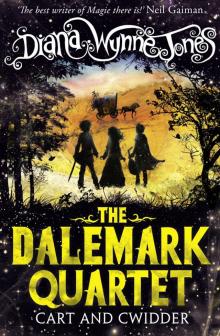 Cart and Cwidder (UK)
Cart and Cwidder (UK)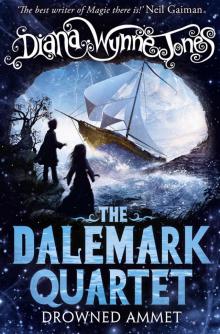 Drowned Ammet (UK)
Drowned Ammet (UK)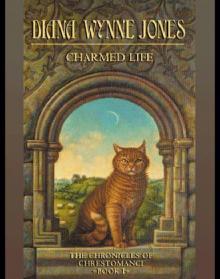 Charmed Life
Charmed Life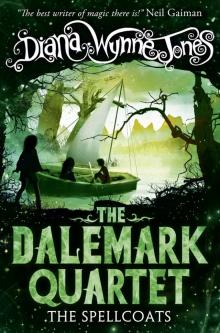 The Spellcoats (UK)
The Spellcoats (UK)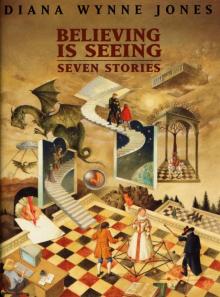 Believing Is Seeing
Believing Is Seeing Samantha's Diary
Samantha's Diary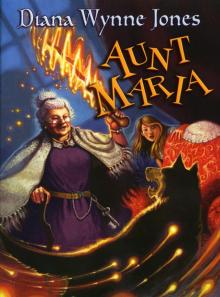 Aunt Maria
Aunt Maria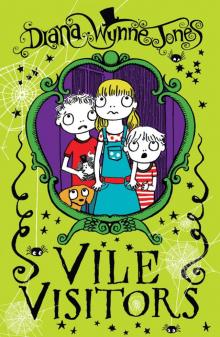 Vile Visitors
Vile Visitors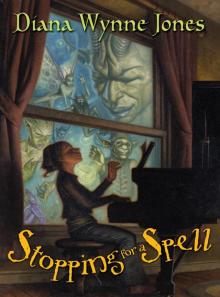 Stopping for a Spell
Stopping for a Spell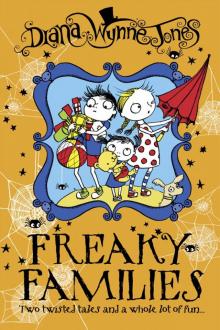 Freaky Families
Freaky Families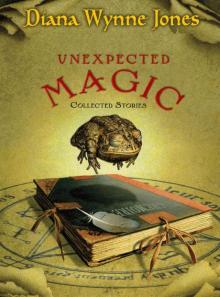 Unexpected Magic
Unexpected Magic Reflections
Reflections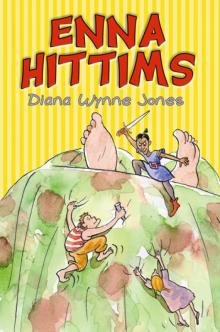 Enna Hittms
Enna Hittms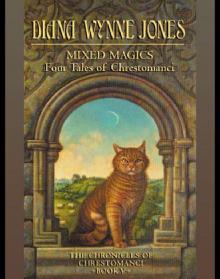 Mixed Magics: Four Tales of Chrestomanci
Mixed Magics: Four Tales of Chrestomanci